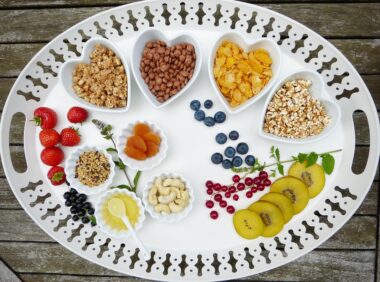Eating for Energy: What to Include in Your Meals
Your daily meal choices significantly impact your energy levels throughout the day. It’s crucial to include a variety of nutrient-dense foods to maintain optimal energy. Prioritize complex carbohydrates found in foods such as whole grains, oats, and legumes. These foods provide a steady release of energy, preventing spikes and crashes in blood sugar. Additionally, consider incorporating fiber-rich fruits and vegetables like berries, apples, and leafy greens. They contribute essential vitamins and minerals, fueling your body effectively. Lean proteins are also vital for energy. Foods such as chicken, turkey, beans, and lentils help repair tissues and support muscle function. Don’t forget about healthy fats; sources like avocados, nuts, and olive oil are essential for energy and overall health. They enhance the absorption of fat-soluble vitamins, promoting energy generation. Adequate hydration is equally important; drink plenty of water throughout the day to keep your body functioning optimally. Finally, planning balanced meals and snacks can streamline your energy levels and improve concentration and stamina.
The Importance of Balanced Meals
Creating balanced meals ensures a blend of macronutrients essential for your body’s energy needs. A well-structured meal includes a protein source, healthy fats, and carbohydrates. Each macronutrient plays a role in energy provision. For example, protein sources like eggs and tofu support muscle repair and maintain energy levels. In contrast, carbohydrates, primarily from vegetables and whole grains, act as the primary energy source. Healthy fats, such as those found in nuts and fish, enhance satiety and provide a longer-lasting energy supply. Consider these combinations for nutritious meals: grilled chicken with quinoa and steamed broccoli, or a bean salad with mixed greens topped with avocado. Additionally, try to vary your protein sources throughout the week to ensure a diverse nutrient intake. This can include fish, poultry, legumes, and plant-based options. Planning meals in advance helps you maintain this balance. It allows you to pre-select energy-dense foods that sustain your energy levels throughout your busy days. This thoughtful approach to meal preparation can significantly alter your daily performance and overall well-being.
When it comes to snacks, choosing energy-boosting options is crucial for avoiding mid-afternoon slumps. Instead of reaching for sugary treats, consider snacks rich in protein, fiber, and healthy fats. For instance, a handful of nuts, Greek yogurt with fruit, or hummus with carrots can provide sustained energy. These choices prevent energy crashes and keep your metabolism active. Preparing healthier snacks in advance is an effective strategy. This not only saves time but also reduces the temptation to grab unhealthy convenience foods. Having energy-boosting snacks on hand makes it easier to maintain your energy throughout the day and avoid unhealthy eating habits. Moreover, consider incorporating superfoods into your diet for an additional energy kick. Foods like chia seeds, spirulina, and sweet potatoes are nutrient-dense and can significantly boost your energy levels. Also, don’t underestimate the power of timing; consuming smaller meals or snacks every few hours can keep blood sugar levels stable. This approach allows for consistent energy distribution throughout your day, resulting in higher productivity and better mood stability.
Power of Hydration
Staying properly hydrated is fundamental for maintaining energy levels consistently. Water plays a crucial role in nearly every bodily function, including nutrient absorption and energy production. Even mild dehydration can lead to fatigue and decreased cognitive abilities. Hence, aim to drink at least eight glasses of water daily, or more depending on your activity level. Consider carrying a water bottle to remind yourself to take sips throughout the day. Additionally, consume hydrating foods like cucumber, watermelon, and oranges. These can supplement your daily water intake while providing vitamins and minerals. During exercise, hydrate before, during, and after to replace fluids lost through perspiration. If you prefer, herbal teas or electrolyte-infused waters can also contribute to hydration while offering additional health benefits. Monitor your body’s hydration signals, including thirst and the color of your urine, as they are good indicators of your hydration status. By prioritizing hydration, you can ultimately boost your energy levels, improve digestion, and enhance overall well-being.
Supplementing your diet can occasionally help enhance energy, particularly if you experience deficiencies. Vitamin B12 is essential for energy production, often found in animal products; vegetarians may need supplementation. Iron is another key nutrient; it aids in transporting oxygen in the blood. Insufficient iron can lead to fatigue. Foods rich in iron include red meat, beans, and spinach. If you are concerned about energy deficiencies or health concerns, consult with a nutritionist or healthcare provider to assess your needs. Additionally, omega-3 fatty acids support brain health and may enhance mood and energy levels. These can be obtained from fatty fish or flaxseeds. While considering supplements, aim for a balanced diet rich in whole foods. Whole foods provide synergistic nutrients that enhance absorption and utilization. However, avoid relying solely on supplements; obtaining nutrients through food is often more effective. Always prioritize whole food sources, as they contain fiber, water, and co-factors necessary for maximum nutrient absorption, thereby energizing your body effectively throughout the day.
Meal Timing and Frequency
The timing and frequency of your meals can significantly impact energy levels and metabolism. Eating smaller, balanced meals throughout the day helps maintain stable blood sugar and energy. This approach contrasts with traditional three large meals, which may lead to energy crashes. Plan your meals and snacks at regular intervals, ideally every three to four hours. This strategy helps optimize energy regulation; you’ll be less likely to experience the post-meal slump often associated with large meals. Incorporate protein into each meal and snack to enhance satiety and control cravings. For instance, pair apple slices with peanut butter for a delicious energy-boosting snack. It’s essential to listen to your body; if you’re hungry, it’s a signal you need nourishment. However, be mindful of emotional or social eating, which may not reflect true hunger. Encourage food variety within your meals for greater nutrient diversity, helping bolster overall energy and health. Practicing mindful eating can foster a better relationship with food and ensure you are eating for energy.
Finally, adopting a comprehensive approach will yield the best results for sustained energy levels. This includes addressing quality sleep, stress management, and physical activity alongside nutrition. Sleep is vital as it allows your body time to recover and recharge. Aim for 7-9 hours each night to optimize energy and performance during the day. Stress can also negatively affect energy levels, so consider incorporating stress-reducing techniques like mindfulness or yoga. Regular physical activity is an essential part of maintaining energy levels too; even moderate exercise can provide energy boosts through improved circulation and endorphin release. Find activities you enjoy to enhance your lifestyle. Additionally, avoid processed foods and excessive sugar, opting instead for whole, nutrient-dense foods that can fuel optimal energy levels. In conclusion, aligning your nutrition, hydration, sleep, and physical activities creates an effective synergy for boosting energy levels, enhancing productivity, and improving your quality of life.






